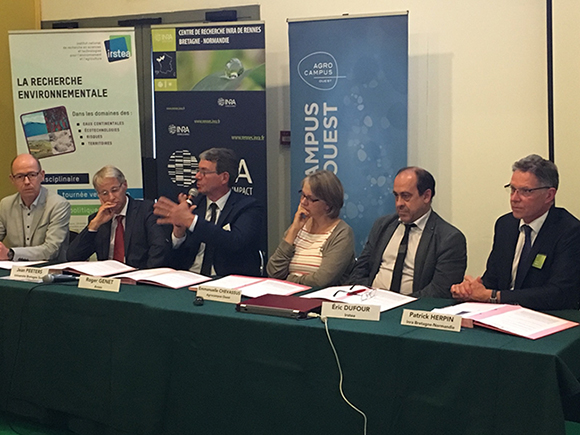Signature of a memorandum of understanding for the creation of the APIVALE Scientific Interest Group on the exploitation of organic effluent
At the International Livestock Trade Fair (SPACE) on Tuesday 12 September, Inra, Irstea, ANSES, Agrocampus Ouest, the University of Southern Brittany and the University of Rennes 1 signed a memorandum of understanding for the creation of a Scientific Interest Group to be known as APIVALE. The partners of the Scientific Interest Group share the ambition of a renewed and more systemic approach for the exploitation of organic effluent in their region.
This memorandum of understanding formalises the partners' joint determination to create a scientific structure bringing together the region's scientific community regarding the exploitation of organic effluent and to develop research partnerships in this field.
An integrated approach to the exploitation of organic effluent
Between them, the partners have all the necessary skills to address the issues relating to the different stages of the production and exploitation of organic effluent, and also to find an integrated approach to the issue, whether at the farm level or in the region as a whole. The scientific expertise of these research teams has been acknowledged in both France and abroad. They already have a quantity of infrastructure and equipment, financed in particular in the framework of the 2015-2020 State-Region Funding Contract. These teams also benefit from a well-structured national partnership network, with development specialists but also with companies specialising in animal and crop productions or in the management and treatment of effluent. Against this background, the creation of the APIVALE Scientific Interest Group is designed to:
- foster joint research and development projects;
- conduct research to improve the exploitation of organic effluent to produce energy, extract compounds with high added value and reduce dependence on non-renewable resources and chemical fertilisers, while taking into account in particular the health risks related to the management of effluent;
- pool resources and achieve the coordinated development of the necessary tools and infrastructure for setting up a multi-site regional platform in the medium term;
- contribute to initial training and to Master 2 courses and PhD studies, and to continuous training for partners outside the Scientific Interest Group.
Inra, Irstea, ANSES, Agrocampus West, the University of Southern Brittanyand the University of Rennes 1 are delighted with this new form of partnership, which will enable them to develop R&D projects aimed at optimising the exploitation of organic effluent throughout the effluent management chain and thus contribute to more sustainable agricultural practices.
